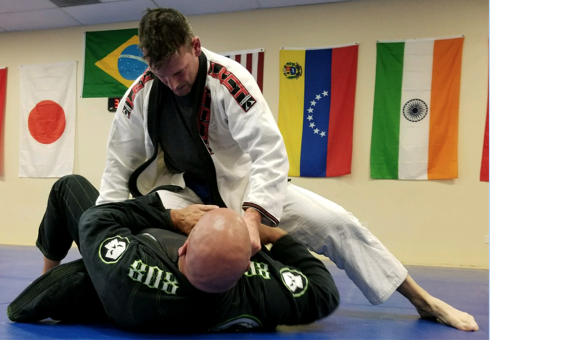
*author Marc Pytlewicz featured in photo
Bruce Lee once said, “I fear not the man who practiced 10,000 kicks once, but I fear the man who has practiced one kick 10,000 times.” Having been in the Brazilian Jiu-Jitsu world for the past few years, I have seen what happens to fighters when they continue to train, but don’t take care of their bodies. They take a beating every day and are always sore or dealing with some nagging pain. They’re training the same drills day after day in the hopes that, when they need it most, their bodies can just react instead of having to think. What many athletes don’t consider is that their daily repetition often leads to the muscles’ inability to return to a relaxed state and they stay chronically tight if they are not treated properly.
Words often used to describe ideal muscles are strong, agile or flexible, but rarely do we hear of athletes seeking muscles that are soft and pliable. At Delos, we believe that restructuring a muscle to a soft, pliable state will lead to increased strength, flexibility, agility and ultimately performance.
What do I mean by pliable? When in a relaxed state, our muscles should be soft and spongy to the touch. Muscles should only feel hard when they are flexed. However, when muscles are hard in a relaxed state, that means the fibers in the muscles are so contracted that they are tight and immobile. Immobility to a fighter of any kind, whether it be in the UFC or in the local Jiu-Jitsu tournaments, can mean the difference between winning and losing.
Three things that my coach Luiz Claudio always tells his Jiu-Jitsu students are:
1. We must create ability to control breathing and heart rate
2. We must be able to control the body to flow like water with the least resistance, and to maintain a certain athleticism and flexibility, which will help perform without getting tired
3. Training and technique must be fluid
Without those first two points, technique and training cannot be performed at their best. When muscle fibers lose the ability to move, or “fire”, they cannot be recruited during the optimal technical movements we perform in matches, which will take away from our power when we need it most.
At Delos, we believe that when muscle fibers are chronically contracted, the most effective way to loosen them is to force those fibers apart with direct, systematic pressure. Delos therapists use pressure that is controlled, organized, multi-dimensional and structured around what the therapist feels while palpating the muscle. With some consistency, contracted fibers begin to break apart, leading to restored physiological function in the muscle. The muscle essentially gets restructured to a soft, pliable state – it is healthy again. A healthy muscle, when called upon to do an action, can then function with close to 100 percent capacity. So the next time you’re in the gym and you’ve either reached a plateau with your training or experience any pain or stiffness, feel the muscles that you’re trying to impact. If they feel hard in a relaxed state, it’s time to give us a call.
- Intermittent Fasting, Autophagy and Physical Changes In The Body - June 16, 2020
- Why Sudden Body Pain Might Not Be So Sudden - May 7, 2019
- What Jiu-Jitsu and Delos Therapy Have Taught Me About Muscle Health - November 1, 2017


